 Podcasts let you create your own Chinese immersion experience, with level-appropriate stories and authentic conversations. Learn flexibly on the go with the best podcasts for beginners, intermediate and advanced students!
Podcasts let you create your own Chinese immersion experience, with level-appropriate stories and authentic conversations. Learn flexibly on the go with the best podcasts for beginners, intermediate and advanced students!
Spoken audio productions, such as podcasts, have grown in popularity in recent years, despite the parallel explosion of video-sharing platforms. Sure, videos are engaging, but you can’t watch a YouTube clip while driving, and staring at a screen after going to bed is not good for your sleep. In these and many other situations, podcasts are just better.
Tune in to the Hacking Chinese Podcast to listen to the related episode #190:
Available on Apple Podcasts, Google Podcasts, Overcast, Spotify, YouTube and many other platforms!
The best podcasts for learning Chinese: Table of contents
In this article, I will recommend the best podcasts for learning Chinese. If you know of a great podcast that I haven’t mentioned here, please leave a comment so I can check it out! I have sorted the recommendations into several categories. If you want to skip directly to the recommendations, please use the links below.
- Podcasts: A gateway to better Chinese
- More about improving Chinese listening ability
- Podcasts or videos for learning Chinese?
- The best Chinese immersion podcasts for all levels
- Beginner podcasts
- Intermediate podcasts
- Advanced podcasts
- Chinese teaching podcasts
- Podcasts about learning Chinese
- Conclusion: Chinese immersion on your terms with podcasts
- Comments and discussion
Podcasts: A gateway to better listening comprehension and beyond
It shouldn’t come as a surprise that podcasts can help you improve your listening ability, but that’s not all you can do. By immersing yourself in spoken Chinese, you will acquire new vocabulary, grammar patterns and more, and this will lead to better speaking, reading and writing over time too. This is partly why I often say that listening is the most important skill of all!
Is speaking more important than listening when learning Chinese?
The immersion category is the most important one by far. You learn Chinese by successfully connecting spoken words with meaning, which requires you to engage with the language. You need comprehensible input and you need lots of it. You also want your listening to be meaning-focused, i.e. that the goal is to understand, not to learn how to use a word or phrase.
Someone using English to explain how a Chinese word or phrase is used might feel like it’s useful, but most of the time, you’re better off repeatedly hearing the word in meaningful contexts. Similarly, listening to someone like me talk about how to learn Chinese is not a substitute for engaging with the language directly.
Podcasts are convenient and make listening easier
Even though I’ve enjoyed listening to audiobooks since the early 2000s, it took a while before I realised the full potential of podcasts. I’m now thoroughly convinced and listen to 15-30 hours a week, sometimes much more. At the moment of writing, this is spread out evenly between Chinese, French and English, with an added sprinkle of Swedish.
Part of the reason podcasts are so appealing is that they are easy to access. You have an app (hopefully a good one; I currently use Pocket Casts on Android) and have easy access to all the content you want. You can queue episodes, listen to them again, change the playback speed and much more. This is easier than dealing with downloaded audio files or subscribing to several different services on different platforms that all require you to be online.
Podcasts also have downsides, especially for beginners when video support might be necessary if you want to avoid translation entirely. Another drawback for more advanced students is that podcasts are much shorter than audiobooks, and it’s hard to listen to hours of Chinese every day if your listening consists of 5-minute snippets.
100 hours of Chinese listening in 3 weeks: What I learnt and how to apply it
Back to the best Chinese podcasts index
More about improving Chinese listening ability
Listening is the most important aspect of learning Chinese. It is the key to all other areas of the language and it’s also possible to combine with many other everyday activities, making it perfect for adults who need to fit their learning into an otherwise busy life. While this article is primarily meant to be about great podcasts, I still want to recommend some important articles and podcast episodes where I discuss listening ability in general:
 The 10 best free Chinese listening resources for all levels – This article contains my best picks for Chinese listening content for beginners, intermediate and advanced students. It also contains an introduction to improving listening ability in Chinese. Naturally, the resources mentioned are not limited to podcasts. Note that all recommendations here are free!
The 10 best free Chinese listening resources for all levels – This article contains my best picks for Chinese listening content for beginners, intermediate and advanced students. It also contains an introduction to improving listening ability in Chinese. Naturally, the resources mentioned are not limited to podcasts. Note that all recommendations here are free! Beginner Chinese listening practice: What to listen to and how – Beginners face unique challenges trying to find suitable listening materials in Chinese. The main issue is that everything is too hard, so in this article, I suggest different ways of working around this problem. Podcasts are only part of the solution!
Beginner Chinese listening practice: What to listen to and how – Beginners face unique challenges trying to find suitable listening materials in Chinese. The main issue is that everything is too hard, so in this article, I suggest different ways of working around this problem. Podcasts are only part of the solution!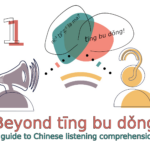 Beyond tīng bu dǒng: A guide to Chinese listening comprehension – This is a series of articles and podcast episodes where we go deep into how listening comprehension works and how you can leverage this information to learn more. The first part contains an overview, which will be helpful for learners on all levels!
Beyond tīng bu dǒng: A guide to Chinese listening comprehension – This is a series of articles and podcast episodes where we go deep into how listening comprehension works and how you can leverage this information to learn more. The first part contains an overview, which will be helpful for learners on all levels! 7 ideas for smooth and effortless Chinese listening practice – While the advice to listen more is indeed simple, it’s not easy to implement in practice. Building the habits necessary to listen to hours of Chinese every day takes time. In this article and podcast episode, I share my best strategies for listening more, gained over more than a decade of trying to listen as much as I can!
7 ideas for smooth and effortless Chinese listening practice – While the advice to listen more is indeed simple, it’s not easy to implement in practice. Building the habits necessary to listen to hours of Chinese every day takes time. In this article and podcast episode, I share my best strategies for listening more, gained over more than a decade of trying to listen as much as I can! 100 hours of Chinese listening in 3 weeks: What I learnt and how to apply it – As mentioned, I listened a lot. I wrote an article about this to dissect the strategies I’ve used to build up my capacity to listen for hours every day, even when not studying Chinese in any formal capacity. You can use these strategies to listen more, no matter if your goal is half an hour per day, an hour or five!
100 hours of Chinese listening in 3 weeks: What I learnt and how to apply it – As mentioned, I listened a lot. I wrote an article about this to dissect the strategies I’ve used to build up my capacity to listen for hours every day, even when not studying Chinese in any formal capacity. You can use these strategies to listen more, no matter if your goal is half an hour per day, an hour or five!
If you want even more, you can always check out the category page for listening ability here on Hacking Chinese!
Back to the best Chinese podcasts index
Podcasts or videos for learning Chinese?
The line between video-sharing services like YouTube and podcast platforms like Apple Podcasts is becoming blurred. Many podcasters (including myself) put their episodes as videos on YouTube, and some more visual content creators post their videos on Apple Podcasts.
For this article, I’m using the distinction that if you have to watch a video, it’s not a podcast. If you can consume the content mostly as intended only by listening, even if there might be video support, it is a podcast. To qualify as a podcast, it also needs to be available on most podcast platforms. Remember, the goal here is to help you listen more, so having the resources available in one app is essential.
I will write a separate article about the best video resources for learning Chinese later, so if you have any suggestions, please leave a comment!
Back to the best Chinese podcasts index
The best Chinese immersion podcasts for all levels
To improve your listening ability, you need to find listening materials you can make sense of. Preferably, you should be able to understand at least the gist of the podcast simply by listening intently, listening more than once, and maybe slowing down the audio if needed. If you need to study a vocabulary list and read a transcript, it’s too hard, but please note that you don’t have to understand every word in every sentence!
The podcasts I recommend below are mostly or entirely in Chinese, while still allowing you to understand what’s going on. Make sure you select podcasts on your level and listen as much as you can!
I have divided my recommendations into three categories.
- Beginner, assuming that you don’t know much Chinese at all.
- Intermediate, when you already have a foundation in Mandarin.
- Advanced, for those who want to focus on specific topics.
Within each category, podcasts are roughly presented in order of difficulty, with easier podcasts coming before more difficult ones.
For more listening suggestions beyond podcasts, you can click on the link for each level above or visit this article:
The 10 best free Chinese listening resources for beginner, intermediate and advanced learners
The best podcasts for beginner learners of Chinese
 Bumpy Chinese / Comprehensible Chinese
Bumpy Chinese / Comprehensible Chinese
Level: Beginner, intermediate
Topic: Listening
Type: Resource collection, Podcast
This is one of the best comprehensible input channels I’ve found so far! That means that she gives you plenty of listening practice without spending five minutes speaking English for every minute of Chinese. There is often no English spoken at all.
The podcast version can be found by searching for “Comprehensible Chinese”, but if you’re a complete beginner, you might want to watch the videos on YouTube as well. The difficult level is carefully controlled, and the host repeats, rephrases, circles and many other things to help you understand even with a limited vocabulary.
Pros: Only Chinese, engaging, built-in repetition, rephrasing and circling.
Cons: Some episodes have to be watched (she refers to images shown on screen sometimes)
Official description: I focus on creating comprehensible input and TPRS stories.
Back to the best Chinese podcasts index
Learning Chinese through Stories (novice level)
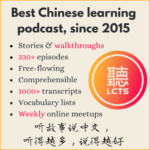 Level: Beginner, intermediate
Level: Beginner, intermediate
Topic: Listening
Type: Resource collection, Podcast
This podcast is mostly free and offers episodes entirely in Chinese. The hosts do a good job of
making sure you understand without relying on translation. Some episodes come in pairs, where one episode consists of a story and the other episode contains an explanation and discussion of that story in Chinese. Both types of episodes are worthwhile, but note that the story is often harder than the episode discussing it. Episodes are usually long, which is great!
Beginners should focus on episodes labelled 1.X.X first, but these can be rather hard to find. If you’re on Spotify, you chan use this playlist. Note that some parts of episodes are harder than others and that as a beginner, you shouldn’t listen to understand everything; focus on what you do understand, not what you don’t understand!
Also note that while episodes are behind a paywall on their website, they are still available on most podcast platforms. This won’t give you transcripts and easy browsing, but you can access most of their content for free this way.
Pros: Good at keeping things in Chinese, dual structure of episodes, generally quite interesting
Cons: Sometimes too hard, difficult to navigate episodes
Official description: 听故事说中文LCTS creates authentic and immersive podcasts. It covers a wide range of topics and proficiency levels(Novice, Intermediate, Advanced). Every story has two parts: story (A) and story explanation (B), accompanied by annotated vocabulary and transcript.
Back to the best Chinese podcasts index
Melnyks Chinese
 Level: Beginner
Level: Beginner
Topic: Listening
Type: Resource collection, Podcast
This website and podcast offer theme-based, progressive online audio lessons. There are transcripts, worksheets, mobile apps, videos and more. Not all of this content is free, but the beginning of the course is, and it’s also available on most podcast platforms, where it’s called “Learn Mandarin Chinese – Chinese Audio Lessons”
While this audio course does contain English, it does work in an audio-only format for complete beginners. The host repeats words and phrases over and over, and also includes other voices in the lessons so you can hear Mandarin pronounced by different people (the hos is a foreigner, but his pronunciation is very good). If you’re not a complete beginner, you should look for immersive listening resources instead, but this can serve as a good and somewhat safe starting point.
Pros: Easy to understand in audio-only format, progressive lessons, lots of built-in repetition
Cons: Too much English
Back to the best Chinese podcasts index
The best podcasts for intermediate learners of Chinese
When you’re past the beginner stage, you should focus on podcasts that make very little or no use of English. You learn Mandarin by listening to Mandarin, not English. There are plenty of resources here to choose from, so no excuses! I have done my best to list these from easiest to hardest, but this task is very difficult. Some podcasts offer episodes on many different levels and most of them are not internally consistent either. If you think I got it wrong, or if you have other suggestions, please let me know in a comment!
 Learning Chinese through Stories (intermediate and advanced levels)
Learning Chinese through Stories (intermediate and advanced levels)
Level: Beginner, intermediate
Topic: Listening
Type: Resource collection, Podcast
This podcast is mostly free and offers episodes entirely in Chinese. The hosts do a good job of
making sure you understand without relying on translation. Some episodes come in pairs, where one episode consists of a story and the other episode contains an explanation and discussion of that story in Chinese. Both types of episodes are very worthwhile, but note that the story is often harder than the episode discussing it. Episodes are usually long, which is great!
Note that while episodes are behind a paywall on their website, they are still available on most podcast platforms. This won’t give you transcripts and easy browsing, but you can access most of their content for free this way.
Pros: Good at keeping things in Chinese, dual structure of episodes, generally quite interesting
Cons: None, really
Official description: 听故事说中文LCTS creates authentic and immersive podcasts. It covers a wide range of topics and proficiency levels(Novice, Intermediate, Advanced). Every story has two parts: story (A) and story explanation (B), accompanied by annotated vocabulary and transcript.
Back to the best Chinese podcasts index
TeaTime Chinese
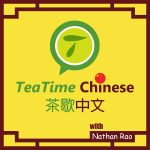 Level: Intermediate
Level: Intermediate
Topic: Listening
Type: Resource collection, Podcast
TeaTime Chinese is an excellent resource for intermediate students or brave beginners. Nathan, the host, talks in slow and clear Chinese about a wide range of topics. Difficulty varies a lot between episodes, with those focusing on everyday life being easier than those focusing on culture or history. If you’re unsure of the appropriate level, start with one of the earlier episodes about daily life, such as episode 19 (My Plan for the Summer). If you feel this is too easy, check out some of the later episodes, such as episodes 68-69 (The Emperor of Qin). You could also check out Speaking Chinese with Da Peng, which is fairly similar, but harder.
The episodes are rarely focused on a dialogue or text but are instead in the form of a more natural monologue. The episodes are sprinkled with occasional English translations but are 99% in Chinese. Nathan also rephrases difficult words and explains some of them in Chinese when necessary. If this is enough for comprehension will differ from student to student, but this is a great resource in any case.
Pros: Only in Chinese, engaging, varied content, fairly long episodes
Cons: Difficulty varies quite a bit between episodes
Official description: TeaTime Chinese podcast is a perfect resource for intermediate Chinese learners. Each week, we are talking about the Chinese language, Chinese culture and everything going on in China, all in a simple and comprehensible manner. If you have reached an intermediate level, yet don’t know how to move on to the advanced level, TeaTime Chinese podcast will take you there.
茶歇中文播客是一个学中文的好材料。每周,我们会用简单易懂的中文来谈论中国语言、中国文化,以及各种中国新闻。如果你已经到达了中级水平,但是不知道怎样到达高级水平,茶歇中文播客会帮助你梦想成真。和我们一起学中文吧。
Back to the best Chinese podcasts index
Maomi Chinese
 Level: Intermediate
Level: Intermediate
Topic: Listening
Type: Resource collection, Podcast
The MaoMi Chinese podcast is suitable for intermediate learners, offering mostly scripted monologues to improve your Chinese. The host is from Guangdong and is quite good at explaining more difficult words and expressions in Chinese. One drawback is that the episodes are written in advance and read aloud, making them less natural. This makes them a little bit harder because there’s less redundancy and more information per unit of time, which in turn might be a pro or a con depending on what you’re after. Some episodes are behind a paywall even on ordinary podcast platforms, but many are available for free!
Pros: Mostly in Chinese, interesting topics, good explanations in Chinese
Cons: Short episodes, scripted content
Official description: MaoMi Chinese is a podcast and website for Mandarin Chinese learners made by a professional Chinese teacher as well as a Chinese learner – to get the best of both perspectives. We share tips and provide listening practice for intermediate+ learners. We make your learning more enjoyable by engaging you with intercultural resources across various topics.
Back to the best Chinese podcasts index
ChinesePod Intermediate and ChinesePod Advanced
 Level: Intermediate, advanced
Level: Intermediate, advanced
Topic: Listening
Type: Resource collection, Podcast
Read my ChinesePod review here!
ChinesePod is the only learner podcast I’m aware of that was around when I started learning Chinese in 2007 and is still around today. This means that there is a humongous library of episodes available, with many thousands of episodes spread over several categories. Not all of these are worthwhile, however, since the lower levels suffer from a serious problem of being mostly in English.
Most episodes are structured around a textbook-like dialogue with vocabulary, grammar patterns and so on. On lower levels (lower-intermediate and below), this is terrible for listening practice, because everything surrounding the dialogue, such as the preparation talk before it starts and all the explanations afterwards, ore almost exclusively in English. Since the dialogues are often built to teach you new words and grammar, they are too hard if you ignore the English, and it’s of course also impractical to skip the bits in English. Thus, I do not recommend ChinesePod for beginners!
For intermediate and even advanced learners, the upper levels can be quite good, however. Starting from upper-intermediate, more and more of the content is in Chinese, and from advanced, everything is in Chinese. If you as an intermediate student think the advanced lessons are too difficult, here’s a trick you can use: Ignore the dialogue they are teaching! This might sound weird, but the conversation in the studio about the dialogue is more useful than the dialogue itself. It’s also more natural, contains more redundancies and is meant to help you understand, not teach you new words.
When browsing the podcast, it’s worth noting that there are different podcasts for each level:
- ChinesePod Intermediate
- ChinesePod Advanced
Pros: So many episodes you will never run out, higher levels mostly or only in Chinese
Cons: Too much English in lower levels
Official description (intermediate): ChinesePod makes learning Mandarin fun and easy! In this Intermediate Level Podcast Feed, explore broader contexts and applications of frequently used expressions needed to navigate comfortably in a Mandarin speaking environment. Deepen your knowledge on current affairs while learning and increase your confidence level in speaking Chinese.
Official description (advanced): In this Advanced Level Podcast Feed, lessons are the black-belt of ChinesePod – You can already speak circles around your friends, but are looking for “complete” fluency Chinese.
Back to the best Chinese podcasts index
Speak Chinese with Da Peng
 Level: Intermediate, advanced
Level: Intermediate, advanced
Topic: Listening
Type: Resource collection, Podcast
This is one of my favourite podcasts for intermediate learners. The host, Da Peng, is good at speaking clearly without making it sound too exaggerated, and he puts a lot of effort into each episode. If you’re tired of scripted dialogues, this is for you! There are several different types of episodes, including those featuring daily Chinese expressions, interviews with advanced learners and more spontaneous monologues. These vary in difficulty, so check a few different types before you decide if this is for you or not.
As with many other podcasts focusing on vocabulary and phrases, it’s okay to not focus too much on the content being taught, and instead focus more on the explanations. These are simpler and more comprehensible for most students. If you come away from an episode about a certain phrase, without feeling that you know that phrase, but you did understand most of what he said in the episode, that’s completely fine!
You could also check out TeaTime Chinese, which is fairly similar, but considerably easier.
Pros: Only in Chinese, engaging, varied content
Cons: Difficulty varies quite a bit between episodes
Official description: 你好!这里是“说中文”播客,我是大鹏。这个播客的目的是为了帮大家更有趣儿地学习中文。我们的重点是听力、发音和常用语。希望这个播客可以给你带来快乐,播客中见!
Back to the best Chinese podcasts index
Learn Mandarin in Mandarin with Huimin
 Level: Intermediate
Level: Intermediate
Topic: Listening
Type: Resource collection, Podcast
This is an excellent podcast for intermediate learners. It’s entirely in Chinese, covers interesting topics and is hosted by a teacher with lots of teaching experience. Episodes are not lessons, however, but natural and flowing monologues. Each episode is long (usually 15-20 minutes) and comes with a difficult rating, making it considerably easier to find content on your level (if you’re not familiar with CEFR, the scale is, from easiest to hardest: A1, A2, B1, B2, C1, C2). The accent is fairly standard Taiwanese Mandarin. If you want less standard and more casual monologues, check out Learn Taiwanese Mandarin.
Pros: Chinese only, slow and clear while still natural-sounding, not scripted, clear difficulty ratings, long episodes
Cons: None that I can think of!
Official description: 大家好,我是惠敏。我是一個來自台灣的中文老師,我從2004年開始教中文,目前已經教了17年。我希望能透過簡單易懂的中文,跟大家分享我在生活中好玩的事情,一些想法,新聞,電影,還有學習語言的經驗和方法,希望你們的中文也會一起進步喔。
Hi, I am Huimin, a Mandarin instructor from Taiwan. I’ve been teaching Mandarin since 2004. I would like to share some thoughts, insights, things that I enjoy, like movies and books, and also my experiences of learning and teaching languages.
Meanwhile, I hope your Mandarin will be improved while following my podcast.
Back to the best Chinese podcasts index
Hake Mandarin
Level: Intermediate
Topic: Listening
Type: Resource collection, Podcast
The official description of this podcast says it all: “Haike Mandarin is hosted by two best friends, Liyi and Xianxian. Sometimes, Liyi’s sister, Xiaoyu, also hosts the show with Liyi. We discuss practical day-to-day topics in Mandarin and share stories from our lives.” While they have topics for each episode, the conversations are natural and unscripted, without specific language-learning goals. If you want to listen in on native speakers talking among themselves about various topics, this podcast is for you. Episodes are long (20-30 minutes). The accent is Taiwanese Mandarin and fairly casual and sometimes non-standard.
Pros: Only Chinese, natural conversations, long episodes
Cons: None, really, if you like this type of podcast
Official description: 聽「還可中文」學中文,讓你的中文不只是「還可」。還可中文是由李伊、仙仙和小雨主持的中文學習podcast,李伊和仙仙是生活中的好朋友,李伊和小雨是姊妹。他們會在節目教你日常會話、分享他們的故事,他們還會罵髒話、用一些流行語,讓你的中文聽起來更自然,讓還可中文負責你的日常中文,但不負責你的考試中文。
Haike Mandarin is hosted by two best friends, Liyi and Xianxian. Sometimes, Liyi’s sister, Xiaoyu, also hosts the show with Liyi. We discuss practical day-to-day topics in Mandarin and share stories from our lives.
Back to the best Chinese podcasts index
Convo Chinese
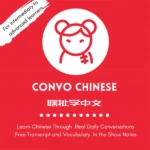 Level: Intermediate, advanced
Level: Intermediate, advanced
Topic: Listening
Type: Resource collection, Podcast
Convo Chinese is tailored for intermediate and advanced learners and dives into genuine Chinese dialogues spanning a wide range of topics from daily life to global politics. As the name implies, these are conversations between the host and one or two guests, often other native speakers, but sometimes also advanced learners. Episodes differ in how much they paraphrase and explain difficult words and expressions, so if you find an episode too hard, try another! Transcripts and vocabulary lists are available on their website or in the show notes.
Pros: Almost only in Chinese, natural conversations, interesting topics
Cons: Somewhat uneven difficulty level depending on the guest(s)
Official description: 瞎扯学中文 Convo Chinese is a podcast to help intermediary to advanced Mandarin learner to immerse in natural and authentic Chinese conversations. In the podcast we discuss topics from daily lives to politics, from China and around the world. Free transcript and vocabulary list are provided in the show notes.
Back to the best Chinese podcasts index
Learn Taiwanese Mandarin
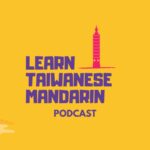 Level: Intermediate
Level: Intermediate
Topic: Listening
Type: Resource collection, Podcast
As the name implies, Learn Taiwanese Mandarin is a podcast for those who focus on Taiwanese Mandarin, but well worth checking out if you want to listen to different accents too (which you should). It is less standard and more casual than Learn Mandarin in Mandarin with Huimin, but otherwise quite similar (natural, non-scripted monologues). Episodes are often quite long, 15-35 minutes, and cover a wide range of topics, from current events to cultural insights and discussions.
Pros: Chinese only, natural, unscripted
Cons: Somewhat uneven difficulty
Official description: Learn Taiwanese Mandarin is a podcast aimed at intermediate to advanced learners.It’s all in Chinese(from the 4th episode), and if there are advanced words, I will explain them using slower and easier Chinese words and sentences! You will also learn some culture knowledge about Taiwan. With more episodes coming out, I’ll also teach you some useful Taiwanese/Hokkien. 跟我一起用中文學習中文吧!
Back to the best Chinese podcasts index
Dashu Mandarin
 Level: Intermediate, advanced
Level: Intermediate, advanced
Topic: Listening
Type: Resource collection, Podcast
This is a great podcast if you want to listen to authentic conversations about a variety of topics. The official description is helpful: “We’re three Chinese teachers that focus on providing authentic and valuable Chinese learning materials for the Chinese learners of intermediate level and above. In this Podcast, we will talk about all kinds of things concerning China and Chinese culture, society, etc.”
Personally, I find the diversity of people on the podcast refreshing and engaging, both in the sense that there are three male teachers in the same podcast (unheard of!) and in the sense that they bring in different guests, including advanced second-language learners. The conversations are unscripted and more chaotic than in most podcasts recommended above, and there is very little in terms of support if you fail to understand something. They often talk over each other, too, and sometimes switch topics rapidly. Thus, this can be hard to follow, but is perfect practice for real-world conversations with more than one person!
Pros: Natural conversations in small groups, engaging and varied content, long episode (30-40 minutes)
Cons: Occasionally chaotic (which can be pro, too)
Official description: Hello, everyone, it’s Dashu Mandarin here. We’re three Chinese teachers that focus on providing authentic and valuable Chinese learning materials for the Chinese learners of intermediate level and above. In this Podcast, we will talk about all kinds of things concerning China and Chinese culture, society, etc.
Back to the best Chinese podcasts index
The best podcasts for advanced learners of Chinese
When you’ve reached an advanced level, there are innumerable options for listening practice. Below, I have suggested some podcasts aimed at advanced learners of Chinese, but you should spend most of your time with authentic podcasts aimed at native speakers. These are not always harder than learner podcasts! I have ranked the recommendations here in order of perceived difficulty, from easiest to hardest.
On this level, most of your listening materials should be authentic (i.e. not aimed at language learners), but there’s still room for advanced podcasts as well. This category contains both types, with the easiest first.
Most of these recommendations come from other learners, so if you have something you think I’d enjoy, please leave a comment below! I’m especially interested in hearing about podcasts towards the easier end of the advanced spectrum.
半拿铁 | 商业沉浮录 (business story podcast)
 Level: Advanced
Level: Advanced
Topic: Listening
Type: Resource collection, Podcast
This podcast focuses on business-related stories, usually about famous business people or the history of big companies. The two hosts take turns researching a project and then tell the other person about it, in a genuine conversation. Because the hosts focus on the same topic for at least an hour, sometimes considerably longer, this is suitable for extensive listening if you already have a decent listening ability. Note that while this is not a learner podcast, I would say that the format makes it easier to follow than many similar podcasts.
Recommended entry points: Find an episode about a person or company you know. Being familiar with the topic helps tremendously.
Official description: 财经媒体人和互联网产品老兵,跟你讲述商业背后的故事。 来杯半拿铁,咱们边喝边唠。
Back to the best Chinese podcasts index
声动早咖啡 (daily business news podcast)
 Level: Advanced
Level: Advanced
Topic: Listening
Type: Resource collection, Podcast
This podcast keeps you up-to-date with business news in short, daily episodes. It’s a great way to both learn Chinese and stay current at the same time. The length of the episodes makes this podcast more suitable for studying than extensive listening, so if you’re looking to expand your vocabulary for talking about business in Chinese, this podcast is great.
As usual, some familiarity with the topics discussed helps, but since much of the content is also covered in mainstream, English-speaking news media, you’re more or less guaranteed to have prior knowledge of some topics.
Recommended entry points: Listen to the most recent episode first. If you’re up-to-date with business news, you will likely be familiar with at least some of the topics. You can always work your way through the archive later!
Official description: 一个十五分钟的晨间仪式,轻松同步日常生活与商业世界。
这是一档由声动活泼出品的清晨播客节目,在工作日的早晨,为你带来与日常生活息息相关的商业科技轻解读,开启能量满满新一天。
Back to the best Chinese podcasts index
铥铥科幻电波 – 未来事务管理局 (science fiction podcast)
 Level: Advanced
Level: Advanced
Topic: Listening
Type: Resource collection, Podcast
This podcast focuses on science fiction in all its forms, from classic works of Western science fiction literature to modern Chinese TV series. Episodes typically focus on specific books, films or TV series, but the discussions are long and wide-ranging.
While you don’t have to have seen or read the work of fiction being discussed, it certainly helps, especially if you find the language challenging. I also suggest that you search for the titles they discuss online, because it’s extremely hard to navigate translated names, so you might know about a topic without realising it!
Recommended entry points: Find an episode about something you are already familiar with (book, film, TV series).
Official description: 这是一档穿透无聊与压抑的有趣电波,我们将在每周陪伴你,在上学、下班、挤地铁、等车时,带着你的有趣灵魂暂时离开,去到星辰深处,踏进赛博世界,在时间线上前后跳跃;去每一个新番、电影和游戏的世界,捕获全世界与幻想有关的新鲜能量……
Back to the best Chinese podcasts index
疲惫娇娃 CyberPink (culture podcast)
 Level: Advanced
Level: Advanced
Topic: Listening
Type: Resource collection, Podcast
This is a (native-level, authentic) podcast about TV, film and culture. Episodes are long, usually 1-2 hours, focusing on a specific topic, such as a TV series or film, or more general. The discussions are wide-ranging and go far beyond the media itself. While you can listen to this podcast without being aware of the media they cover, I would recommend at least some familiarity with the topic.
The link is to Apple Podcasts, but it’s available on multiple platforms, including YouTube.
Recommended entry points: Episode 31 about the Barbie film, or Episode 32 about the Oppenheimer film (assuming you’ve seen either of them).
Official description: 疲惫娇娃是一档从荧幕聊到宇宙深处的泛文化播客,用女性的声波延展对世界的参与和想象。在一个内陷的时代,疲惫娇娃站在中国和美国的交汇点上,用女性的元视角去观察、抵抗、塑造政治和社会对流行文化的影响。我们讨论流动的时代精神、艺术、自由、未来、友谊以及一切使我们获得力量的事物。
Back to the best Chinese podcasts index
The best Chinese teaching podcasts
You might have noticed that I didn’t list any recommendations for this category in the table of contents. This is not a mistake. Most learner podcasts that try to teach you Chinese do so largely in English, and I advise you against relying on these too much. Unless you’re a complete beginner, you should invest almost all your listening time in the immersion category above.
As mentioned already, podcasts which are mainly in English with occasional words and phrases in Chinese might feel like they are effective learning tools, but they are not. The amount of Mandarin you’re exposed to per minute is very low and anything new you encounter is not embedded in a meaningful context. You’re not trying to understand what something means, especially since the English translation follows immediately after, or in some cases, even before.
I will return to this topic in a future article, but if you came here to find podcasts that teach you Chinese, it’s my honest opinion that you should reconsider. The podcasts I have recommended above are mostly in Chinese and you will learn much more from them, even though it will be more demanding, especially in the beginning. Trust me! And good luck!
Okay, if you really want a podcast to get started with, you can use Melnyks Chinese which I recommended above. He still uses a lot of English, but at least words are repeated often enough that you stand a chance of actually learning something. Nothing says you have to limit yourself to podcasts, though, so you should also check out the beginner category in my big listening resource recommendation article!
The 10 best free Chinese listening resources for beginner, intermediate and advanced learners
Back to the best Chinese podcasts index
The best podcasts about learning Chinese
While listening to someone talking about learning Chinese in English will not teach you the language directly, it can still have a positive impact on your learning. For example, it’s not obvious how you should learn Chinese to get the most out of the time you invest, so information about learning strategies can be invaluable. Furthermore, hearing from others who have learnt Chinese can be both inspiring and encouraging. I recommend listening to these podcasts, but not at the cost of listening to content in Chinese.
The Hacking Chinese Podcast
 Level: Beginner, intermediate, advanced
Level: Beginner, intermediate, advanced
Topic: Language learning
Type: Information and advice, Podcast
This is my podcast! It is about how to learn Mandarin, with in-depth discussions about how to approach challenges, solve problems and get the most out of your learning.
Recommended entry points: Episode 0 – Welcome to the podcast! Beyond that, choose topics that you are interested in! If you want to listen chronologically, start from the most recent episode.
Official description: A podcast about how to learn Mandarin. In-depth discussions about how to overcome challenges, solve problems and get the most out of your learning.
Back to the best Chinese podcasts index
You Can Learn Chinese
 Level: Beginner, intermediate, advanced
Level: Beginner, intermediate, advanced
Topic: Language learning
Type: Information and advice, Podcast
This podcast is similar to mine in that it also discusses how to learn, but the discussions are usually shorter and more lively. Most of the episodes also have a second part with an interview with someone who might encourage or inspire you to learn Mandarin!
Recommended entry points: Choose a topic you find interesting and/or challenging!
Official description: Learn HOW to learn Chinese with hosts Jared Turner and John Pasden. You will learn tips, strategies, and insights so you can supercharge your language learning. You will also be inspired by guest interviews with people from all over the world who have learned Chinese.
Back to the best Chinese podcasts index
I’m Learning Mandarin Podcast
 Level: Beginner, intermediate, advanced
Level: Beginner, intermediate, advanced
Topic: Language learning
Type: Information and advice, Podcast
I’m Learning Mandarin provides interviews and in-depth discussions about various topics related to learning Chinese. I find the interviews here more interesting than in many other podcasts, partly because the topics are specific enough to be interesting, and partly because the guests have more to share than just their personal experiences.
Recommended entry points: Choose a topic you find interesting and/or challenging!
Official description: The goal of this podcast is to help you learn how to learn Chinese. I’ve been learning Mandarin independently outside China while working full time for five years. Each episode I will be discussing a new topic regarding how best to learn Chinese, drawing on stories and insights from my experience.
Back to the best Chinese podcasts index
Conclusion: Chinese immersion on your terms with podcasts
While I do believe there are some downsides with podcasts, such as shorter length and more fragmented listening, I think the upsides are more important. Podcasts enable you to spend more time with the Chinese language and related topics while being convenient and suitable for learning on the go.
Naturally, this only works if you can find awesome podcasts, and the purpose of this article was to help you do that. If you have any podcast recommendations, please leave a comment below! Please don’t forget to include why you are recommending it too!
Many of the podcasts listed above are recommendations from students. I want to particularly thank Warren, who introduced me to many of the intermediate podcasts.

Tips and tricks for how to learn Chinese directly in your inbox
I've been learning and teaching Chinese for more than a decade. My goal is to help you find a way of learning that works for you. Sign up to my newsletter for a 7-day crash course in how to learn, as well as weekly ideas for how to improve your learning!

9 comments
Is this just an ad, or what? Most of these are blocked by some kind of wall.
What do you mean? Nothing in this article is sponsored. I listened through many episodes from all the podcasts mentioned here when writing this article and I did not need to pay for anything. Only MaoMi Chinese has some locked episodes, all the others are completely free, at least when I checked. Please note that I’m reviewing podcasts here, so if you go to their websites, there might very well be paid content behind a paywall. Most podcasts charge for transcripts, exercises and so on, but that’s not what I’m reviewing here. If you click the links on your phone or search for them on any podcast platform, you’ll find that almost everything is freely available!
Thanks for this list! I’m excited to try some of these podcasts.
I’m not sure if you have recommended this podcast before, 打个电话给你 One Call Away Podcast, but I would like to leave it here as a recommendation any way! As an advanced learner, it is one of my favorite podcasts for a few reasons. It is completely in chinese, the episodes are about 40-50 min long, and the content is very engaging to me, and easy to follow. The episodes are spontaneous dialogues between the two female hosts, who talk mainly about daily life stuff, like their careers, relationships, trips, movies they watched, etc. Each episode is centered around a topic, and their conversations are always casual, funny, but also deep sometimes, and they often leave me thinking about something they mentioned. I never get bored mid episode and I often laugh with them. Given that their content itself is not really complex, I would say it’s suitable for intermediate learners too. Hope more learners can listen to it! (Transcripts are available too, through subscription)
Thank you for the recommendation! I checked out more than 50 podcasts when writing this article, but I somehow did not find 打个电话给你. I note there’s a whopping 419 episodes, which is big advantage in and of itself. I’ve added this to my list of podcasts to check out!
“Chinese” is short for “Standard Chinese” here, which I’m sure you’re aware of, although you clearly do not approve of this usage. If you prefer another way of labelling the language, I think you’d be more successful if you simply stated your opinion instead so other people can see it. I think I know what you mean, but many students who read the article and your comment don’t. In general, there are contexts where my usage is not specific enough or misleading, but I don’t think this is one of them. Also, just for the record, the word “Mandarin” is mentioned 43 times in the article.
The Real Story by The Reporter 報導者. Excellent current events discussions and interviews from Taiwan. Sort of like a Taiwanese version of The Daily from the New York Times.
Great, thanks! I’ve added it to my list of podcasts to check out!
Thanks Olle, I found some really good gems in this list! I can also recommend the following as an Intermediate (Immersion type) podcast: Talk to Me in Chinese.
https://podfollow.com/1521247617/links
This monthly podcast is also available in video form:
https://www.youtube.com/playlist?list=PLoccM613pT_b2Hu6eGiQX0iwGOhtWi8j0
Watching the video format is optional, but I it adds a bonus to her podcast — manually-annotated pinyin and transcription, so you can improve both your listening and reading skills.
Thanks for sharing! I have that one on my watch list already, so I will take a closer look next time. Having video is a clear benefit in general, although I can’t really demand that when the article is about podcasts. Still a bonus, nevertheless! Thanks again for sharing!